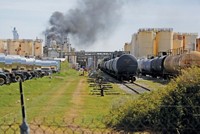Advertisement
Grab your lab coat. Let's get started
Welcome!
Welcome!
Create an account below to get 6 C&EN articles per month, receive newsletters and more - all free.
It seems this is your first time logging in online. Please enter the following information to continue.
As an ACS member you automatically get access to this site. All we need is few more details to create your reading experience.
Not you? Sign in with a different account.
Not you? Sign in with a different account.
ERROR 1
ERROR 1
ERROR 2
ERROR 2
ERROR 2
ERROR 2
ERROR 2
Password and Confirm password must match.
If you have an ACS member number, please enter it here so we can link this account to your membership. (optional)
ERROR 2
ACS values your privacy. By submitting your information, you are gaining access to C&EN and subscribing to our weekly newsletter. We use the information you provide to make your reading experience better, and we will never sell your data to third party members.
Safety
Investigators Say West Virginia Chemical Spill Was Preventable
Storage Tanks: Chemical Safety Board cites corrosion, lack of inspections, as cause of massive leak
by Glenn Hess
July 18, 2014
Holes and pits in a chemical storage tank filled with 4-methylcyclohexanemethanol (MCHM) and propylene glycol phenyl ethers (PPh) helped cause the massive leak in January that contaminated drinking water supplies for hundreds of thousands of West Virginians, federal investigators say.
In preliminary findings on the accident at Freedom Industries’ facility in Charleston, officials with the Chemical Safety & Hazard Investigation Board (CSB) say they found two small holes, each less than an inch in size, in the bottom of the 48,000-gal main storage tank. The culprit appears to be corrosion, likely resulting from water leaking through holes in the roof and settling on the tank floor.
Furthermore, the CSB inspection team found a similar hole in the bottom of an adjacent tank at the site. Other tanks also showed multiple signs of pitting and metallurgical damage.
Investigators say the corrosion went unnoticed until the bottom of the main tank was breached and up to 10,000 gal of MCHM mixed with 5.6% PPH migrated through soil and gravel under the facility before spilling into the Elk River on Jan. 9.
It doesn’t appear that any formal engineering inspections were performed on the storage tanks at the Charleston facility prior to the leak, according to CSB. “While our investigation is still under way, it has become clear that Freedom Industries did not have a rigorous inspection program for these chemical storage tanks,” investigator Lucy Tyler says.
West Virginia lawmakers have responded to the spill by establishing a number of registration and inspection requirements for aboveground storage tanks such as those at Freedom Industries.
“Whatever the governing regulations, and whatever the precise failure mechanism, companies have a responsibility to operate in a safe manner,” CSB Investigation Supervisor Johnnie Banks says. “Not inspecting corrodible steel aboveground storage tanks proved to be an accident waiting to happen.”
The main storage tank at the facility has been dismantled, and pieces are undergoing metallurgical examination. Banks says he is confident that the forensic data “will enable us to determine the exact cause of the corrosion and, we hope, determine how long it had been going on.”
CSB hopes to complete its investigation and issue a final report within a year.



Join the conversation
Contact the reporter
Submit a Letter to the Editor for publication
Engage with us on Twitter